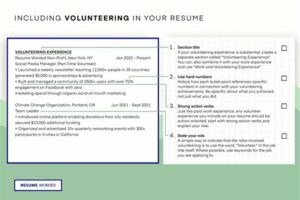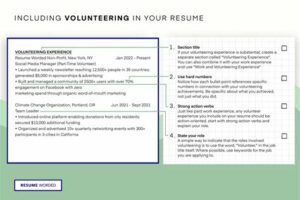Table of Contents
Learn how to effectively explain your volunteer work on your resume with our helpful guide. Highlight the skills and experiences gained through volunteering and showcase your commitment to community service. Impress potential employers by demonstrating your dedication, leadership, and teamwork abilities. Discover tips and examples to craft a compelling resume that showcases your volunteer work in the best possible way.
When it comes to crafting a compelling resume, highlighting your volunteer work can be just as important as showcasing your professional experience. Not only does volunteer work demonstrate your commitment to giving back to the community, but it also showcases valuable skills and experiences that can make you stand out from other applicants. In this article, we will discuss how to effectively explain your volunteer work on your resume, ensuring that it grabs the reader’s attention and enhances your professional image.
The Importance of Including Volunteer Work on Your Resume
In today’s competitive job market, having volunteer work on your resume can greatly enhance your chances of landing your dream job. Volunteer work not only demonstrates your commitment to giving back to the community, but it also showcases valuable skills and experiences that employers often look for in potential candidates.
Showcasing Transferable Skills
When listing your volunteer work on your resume, it is essential to highlight the transferable skills you have gained through your experiences. These skills can range from leadership and teamwork to communication and problem-solving. By including specific examples of how you utilized these skills during your volunteer work, you can effectively demonstrate your ability to apply them in a professional setting.
Highlighting Relevant Experiences
Volunteer work allows you to gain practical experience in areas that may be directly or indirectly related to your desired career path. For instance, if you are applying for a marketing position, mentioning your experience in organizing fundraising events can showcase your event planning and promotional skills. Remember to tailor your volunteer experiences to align with the requirements of the job you are applying for.
Demonstrating Commitment and Passion
Volunteering is often seen as an indication of your dedication and passion for helping others. Employers value individuals who are committed and have a sense of purpose beyond their professional endeavors. By including volunteer work on your resume, you can portray yourself as someone who goes above and beyond and is driven by a desire to make a positive impact.
How to Incorporate Volunteer Work into Your Resume
Include a Dedicated Volunteer Experience Section
To effectively showcase your volunteer work on your resume, create a separate section dedicated to it. This allows employers to easily identify and assess your experiences. Use bullet points to highlight key responsibilities, accomplishments, and skills gained during each volunteer role.
Quantify Your Achievements
Whenever possible, quantify your achievements to provide concrete evidence of your impact. For example, instead of simply stating that you organized a fundraising event, mention the amount of money raised or the number of attendees you managed to attract. These quantifiable results help employers understand the scope and scale of your contributions.
Focus on Relevant Volunteer Work
While it is important to include all your volunteer experiences, prioritize those that are most relevant to the job you are applying for. This ensures that the hiring manager can quickly identify the skills and experiences that align with their requirements.
Use Action Verbs
When describing your volunteer work, use strong action verbs to convey your responsibilities and accomplishments effectively. Words like coordinated, led, initiated, and managed demonstrate your proactive approach and leadership abilities.
Final Tips for Including Volunteer Work on Your Resume
Proofread and Edit
Just like any other section of your resume, it is crucial to proofread and edit your volunteer work section thoroughly. Ensure that there are no grammatical errors or typos that may detract from your professional image.
Tailor Your Resume
Customize your resume for each job application by emphasizing the volunteer experiences that align most closely with the job requirements. This targeted approach demonstrates your relevance and suitability for the position.
Be Prepared to Discuss Your Volunteer Work
During interviews, be prepared to discuss your volunteer work in more detail. Be ready to provide specific examples of how your experiences have shaped you both personally and professionally.
By following these tips and incorporating your volunteer work effectively into your resume, you can enhance your chances of standing out from the competition and impressing potential employers.
Introduction to Volunteer Work on Resume
When including volunteer work on your resume, it is essential to demonstrate the value you gained from your experience and how it aligns with the job you are applying for. By highlighting your volunteer work, you can showcase your skills, dedication, and commitment to making a positive impact. Here are some tips on how to effectively explain your volunteer work on your resume.
Clearly Define the Volunteer Work
Begin by clearly stating the name of the organization or cause you volunteered for, the specific role or position you held, and the duration of your involvement. This will provide a clear understanding of the type of volunteer work you undertook and the level of commitment you demonstrated.
Highlight Your Responsibilities and Achievements
Within each volunteer role, outline the specific responsibilities you undertook and the achievements you accomplished. For example, if you volunteered at a local animal shelter, you may have been responsible for feeding and bathing the animals, coordinating adoption events, or providing administrative support. Highlight any accomplishments that positively impacted the organization or community.
Emphasize Transferable Skills
Volunteer work often provides the opportunity to develop and enhance various transferable skills, such as teamwork, communication, problem-solving, and leadership. When explaining your volunteer work on your resume, focus on the skills you gained or improved upon, and how they are relevant to the position you are applying for. This will demonstrate your ability to transfer these skills to a professional setting.
Quantify Your Impact
Wherever possible, quantify the impact of your volunteer work. This could include the number of hours you volunteered, the amount of money you helped raise, or the number of individuals you assisted. Quantifying your impact provides concrete evidence of your contributions and showcases your dedication and results-driven approach.
Relate Volunteer Work to Professional Experience
If your volunteer work directly relates to the job you are applying for, make sure to highlight this connection. Mention any similarities in tasks, environment, or skills required. This will help the hiring manager understand the relevance and significance of your volunteer work to the position at hand.
Include Relevant Training or Certifications
Did your volunteer work involve any specific training or certifications? If so, be sure to include these details on your resume. By showcasing your commitment to personal growth and development, you demonstrate your willingness to go above and beyond to acquire the necessary skills.
Demonstrate Long-Term Commitment
If you have been involved with a particular volunteer organization or cause for an extended period, emphasize your long-term commitment. This provides evidence of dedication, reliability, and the ability to stay committed to a cause or project. It also showcases your ability to balance volunteer work with other responsibilities, such as employment or education.Remember, when explaining your volunteer work on your resume, it is important to tailor your message to the specific job requirements and highlight the skills and experiences most relevant to the position. By effectively articulating your volunteer work, you can demonstrate your passion, dedication, and value as a candidate.
When it comes to explaining volunteer work on a resume, it is important to showcase the skills and experiences gained during these activities in a professional and succinct manner. Including volunteer work on a resume can demonstrate a commitment to community involvement, highlight transferable skills, and provide evidence of personal growth and development.
Below are some tips on how to effectively explain volunteer work on a resume:
- Include a dedicated section: Create a separate section titled Volunteer Experience or Community Involvement to clearly highlight your volunteer work. This will ensure that hiring managers can easily identify and assess your commitment to community service.
- Provide a brief description: Start by briefly describing the organization or cause you volunteered for. Include the name of the organization, its mission, and any notable achievements or initiatives you were involved in. Keep this description concise, ensuring that it fits within a bullet point or two.
- Highlight specific responsibilities: Detail the specific roles and responsibilities you had while volunteering. Focus on tasks that are relevant to the job you are applying for. For example, if you volunteered as a mentor, emphasize your ability to provide guidance, support, and leadership.
- Quantify your impact: Whenever possible, quantify your achievements or the impact you made during your volunteer work. For instance, if you helped organize an event, mention the number of participants or funds raised. Quantifying your impact helps employers gauge the level of responsibility and success you achieved in your volunteer role.
- Showcase transferable skills: Volunteer work often equips individuals with valuable skills such as communication, teamwork, problem-solving, and organization. Highlight these skills on your resume, providing examples of how you utilized them during your volunteer work. Emphasize how these skills are applicable to the job you are seeking.
- Emphasize consistency: If you have volunteered for multiple organizations or have a long-standing commitment to one organization, emphasize your consistency and dedication. This demonstrates your reliability and ability to commit to long-term projects or causes.
- Include relevant certifications or training: If you have received any certifications or completed training programs related to your volunteer work, be sure to include them on your resume. This can further enhance your qualifications and demonstrate your commitment to personal and professional development.
- Use action verbs: When describing your volunteer work, use action verbs to make your experiences more impactful. For example, instead of saying assisted with event planning, say coordinated logistics for fundraising events. This helps to convey your active involvement and initiative.
- Keep it concise and relevant: As with any section on a resume, it is important to keep the content concise and relevant. Focus on the most significant and impactful aspects of your volunteer work. Be mindful of the job requirements and tailor your descriptions accordingly.
By following these tips, you can effectively explain your volunteer work on a resume in a professional and compelling manner. Showcasing your community involvement and the skills gained through volunteering can significantly enhance your chances of landing the job you desire.
Thank you for visiting our blog and taking the time to learn about how to explain volunteer work on your resume. As you may know, volunteer work can be a valuable asset when it comes to showcasing your skills, experiences, and commitment to making a difference in your community. In this article, we have provided some essential tips and strategies to help you effectively highlight your volunteer work in a professional and compelling manner.
First and foremost, it is important to understand the significance of framing your volunteer work within the context of your overall professional experience. While volunteer work may not be directly related to your desired career path, it still holds immense value. Begin by creating a dedicated section on your resume specifically highlighting your volunteer experiences. This will ensure that your volunteer work is given the attention it deserves and is not overshadowed by your employment history.
Next, focus on emphasizing the skills and qualities you have gained through your volunteer work. Transition words such as Furthermore, Moreover, or In addition can be used to introduce these points in a clear and organized manner. For example, if you have been involved in organizing fundraising events for a non-profit organization, you can highlight your skills in event planning, budget management, and team coordination. These are transferable skills that can be beneficial in various professional settings and are worth mentioning on your resume.
In addition to skills, it is crucial to showcase the impact you have made through your volunteer work. Employers are often interested in candidates who have demonstrated a commitment to social responsibility and community engagement. Use transition words like For instance, To illustrate, or As evidence to provide specific examples of how your volunteer work has made a difference. Whether you have contributed to improving educational opportunities for underprivileged children or have supported environmental conservation initiatives, make sure to quantify your achievements whenever possible to demonstrate the tangible results of your efforts.
In conclusion, incorporating your volunteer work into your resume can greatly enhance your overall professional profile. By following the tips and strategies outlined in this article, you can effectively showcase your volunteer experiences, skills, and the impact you have made. Remember to use a professional tone and utilize transition words to ensure a well-structured and compelling representation of your volunteer work. We hope that this article has provided you with valuable insights and wish you the best of luck in your future endeavors.
.
People Also Ask about How to Explain Volunteer Work on Resume:
1. Should I include volunteer work on my resume?- Yes, including volunteer work on your resume can be highly beneficial. It showcases your commitment to making a difference in your community and highlights your skills and experiences beyond paid employment.2. How do I list volunteer work on my resume?- When listing volunteer work on your resume, create a separate section dedicated to it. Include the name of the organization, your role or position, dates of involvement, and a brief description of your responsibilities and achievements. Highlight any relevant skills or accomplishments gained through your volunteer work.3. How can I emphasize volunteer work on my resume?- To emphasize your volunteer work, you can showcase it prominently on your resume by placing it near the top, especially if it is directly related to the job you’re applying for. Use action verbs and specific details to describe your contributions and impact. Quantify your achievements whenever possible, such as the number of people you helped or the funds you raised.4. What if my volunteer work is unrelated to the job I’m applying for?- Even if your volunteer work is unrelated to the job you’re applying for, it can still demonstrate valuable qualities such as teamwork, leadership, communication skills, and a strong work ethic. Focus on transferrable skills gained through your volunteer experiences that can be applicable to the desired position.5. Can I include volunteer work if I have no professional experience?- Absolutely! Including volunteer work is an excellent way to showcase your skills and dedication, especially if you have limited professional experience. It demonstrates your willingness to contribute and your ability to take initiative, which can impress potential employers.Remember to tailor your resume to each job application, highlighting the most relevant volunteer experiences and skills that align with the position. Use concise language, quantify your achievements, and always proofread your resume for errors before submitting it.






